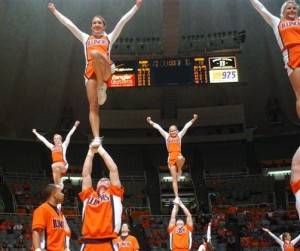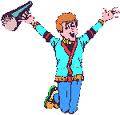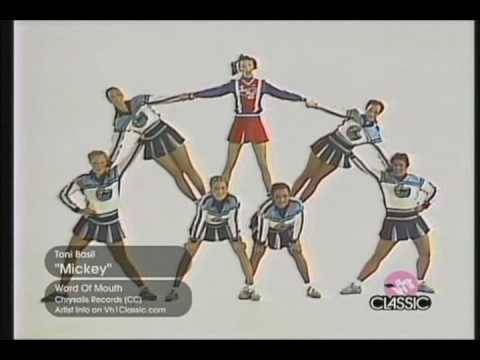
If you read this, you’re gay.
…
Well, since you’ve already come this far (I can’t believe you‘re still reading), consider that you also might be labeled “gay” if you’re a male and are: fashionable, funny, sensitive, outgoing,…or a cheerleader.
Having been considered all of those things myself (“fashionable” aside), my sexuality has been questioned more times than a straight man in today’s society should admit. So why am I so open about it? Probably because I was a cheerleader.
I started cheerleading in high school, and continued into college at UIUC. I became an expert at chucking people twenty feet in the air, holding them in twisted shapes, feet above my head, and doing back flips on command; but perhaps the most important things I learned really had nothing to do with cheerleading and more to do with dysfunctional social norms. Being a heterosexual male caught up in a “gay sport” afforded me a very personal and intense look at contemporary issues with sexual identity and beyond.
 Early in my cheerleading career, gender stereotypes forced me to go through an internal struggle concerning the fact that I could potentially be gay. How could I be a cheerleader, not be part of a fantasy football league, value girls’ friendships, and not be gay (I mean other than the whole being gay thing)? And because I thought this way myself, how could I be upset with anyone else who assumed the same? I couldn’t. I didn’t have a clear idea of what “gay” was. It seemed like it was just a word used to describe something out of the mainstream or unwelcome, as in, “Dude, those shoes are gay.” But through my friendships and dealing with some particularly trying situations, I eventually became very comfortable with myself and the idea of being mistaken as a homosexual. Soon enough, thanks to my experiences in the wild and crazy world of cheerleading, I learned that gay people are often much more interesting, intelligent, and outgoing than those who look down on homosexuality. From my personal perspective, gay people tend to be more open to experiencing everything the world has to offer, whereas people that shun homosexuals have closed themselves off from anything outside of their comfort zone. I began to catch on to the fact that a person’s sexuality, race, and religion don’t completely make them who they are; it’s more to do with how we think about things and deal with life’s situations.
Early in my cheerleading career, gender stereotypes forced me to go through an internal struggle concerning the fact that I could potentially be gay. How could I be a cheerleader, not be part of a fantasy football league, value girls’ friendships, and not be gay (I mean other than the whole being gay thing)? And because I thought this way myself, how could I be upset with anyone else who assumed the same? I couldn’t. I didn’t have a clear idea of what “gay” was. It seemed like it was just a word used to describe something out of the mainstream or unwelcome, as in, “Dude, those shoes are gay.” But through my friendships and dealing with some particularly trying situations, I eventually became very comfortable with myself and the idea of being mistaken as a homosexual. Soon enough, thanks to my experiences in the wild and crazy world of cheerleading, I learned that gay people are often much more interesting, intelligent, and outgoing than those who look down on homosexuality. From my personal perspective, gay people tend to be more open to experiencing everything the world has to offer, whereas people that shun homosexuals have closed themselves off from anything outside of their comfort zone. I began to catch on to the fact that a person’s sexuality, race, and religion don’t completely make them who they are; it’s more to do with how we think about things and deal with life’s situations.
 It seems that somewhere down the line, we began to think that it’s easier to understand others by classifying them according to their differences. Maybe that served a useful purpose at some point in time, but in today’s world, with men and women (for the most part) considered equal, and technology making it possible to throw people of all different backgrounds into the same schools, businesses, and chat rooms, this way of thinking is nothing short of destructive. It isn’t making anything easier, mainly because individuals simply can’t be classified; everyone’s unique. It’s a concept that’s so simple, yet so difficult for many people to realize on their own. But if gender stereotyping is clearly an outdated way of thinking, why is it so hard for people to change?
It seems that somewhere down the line, we began to think that it’s easier to understand others by classifying them according to their differences. Maybe that served a useful purpose at some point in time, but in today’s world, with men and women (for the most part) considered equal, and technology making it possible to throw people of all different backgrounds into the same schools, businesses, and chat rooms, this way of thinking is nothing short of destructive. It isn’t making anything easier, mainly because individuals simply can’t be classified; everyone’s unique. It’s a concept that’s so simple, yet so difficult for many people to realize on their own. But if gender stereotyping is clearly an outdated way of thinking, why is it so hard for people to change?

Perhaps it all stems from the fact that it’s often easier to ignore an issue or the facts, and much more difficult to challenge our own beliefs or change our way of thinking, but that’s the only way that progress can be made. For example, there was a time when the concept of evolution was an issue most people chose to ignore, and they did it until it was too difficult to continue doing so. Likewise, only when those brave enough to challenge contemporary thinking about gays, lesbians, bisexuals, whites, Hispanics, blacks, Catholics, Jews, Muslims, etc. become too loud to ignore, will people be convinced to evolve and reconsider their perceptions of those different from themselves. But the social stereotypes and mores that we watch and hear every day encourage us to dig into a deeper and deeper hole, making it near impossible to see and hear the world around us.
That’s why I take it as a compliment whenever I’m questioned as gay. There aren’t too many negative stigmas associated with gay men — most involve being attractive (great body and dress), intelligent, and outgoing. Besides, if someone means it as an insult (which perplexes me), I’m comfortable knowing that he/she is most likely oblivious to what a “gay” man actually is, and just assumes it’s some type of nebulous “bad.” So, here’s to you, cheerleading! By being the vessel through which I came to realize such a simple concept as: people cannot be (but somehow are) judged solely on their sexuality, you have been a catalyst to clearer thinking and understanding that may have otherwise taken decades for me to fully grasp. Now, I challenge others to be their own catalysts and question their beliefs concerning sexuality and beyond.









